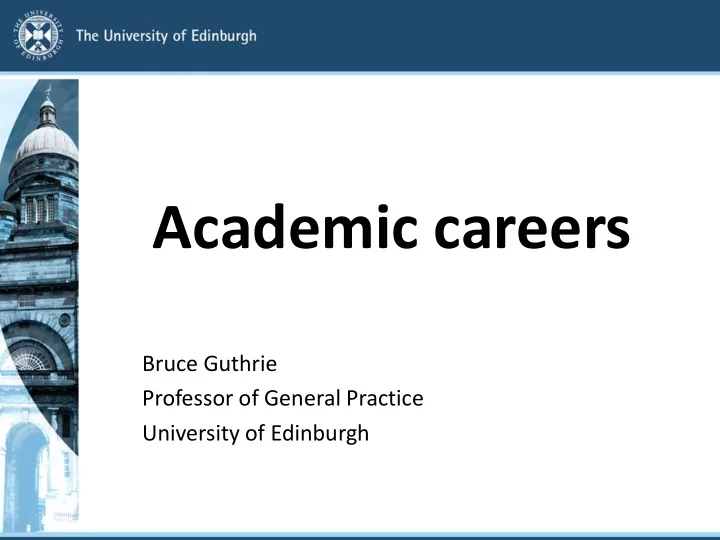

Academic careers Bruce Guthrie Professor of General Practice University of Edinburgh
Why am I here? • Academics matter • Some GPs want a full-time academic career • Some GPs want an academic career element – Teaching – Research • Research skills have many applications • Confusing career path to the outsider
Core message • If you or a trainee wants to discuss research or teaching careers or opportunities, then please get in touch… • Prof David Weller David.Weller@ed.ac.uk (Head of Department) • Prof Bruce Guthrie Bruce.Guthrie@ed.ac.uk • Prof Stewart Mercer Stewart.Mercer@ed.ac.uk • Dr Karen Fairhurst Karen.Fairhurst@ed.ac.uk (Head of Teaching)
Early career entry points 1 - SCREDS • Scottish Research Excellence Development Scheme – Designed to exclude GPs • GP SCREDS – One each in Aberdeen, Dundee, Edinburgh and Glasgow but likely to be an expansion in numbers in near future – Usually enter at end of ST2, sometimes at end of ST1 – ST3 is extended by one year with 50:50 clinical:academic training in ST3 and ST4 – Pay at standard trainee rates – Focus is research (but can be educational research) – Do core academic training, do one or more projects & publish
Early career entry points 2 – post-CCT • NES funded Clinical Academic Fellowships • Four WTE posts • Offer 4-8 sessions of academic time – Clinical time is self organised – Academic time is paid at standard trainee rates • Can get a second year but reapply so in competition • Do core academic training, do one or more projects & publish • Expectations depend on where you are coming from – Can do this from SCREDS or from normal clinical training
Targeted exit • Externally funded PhD fellowship – Typically three years – Paid at trainee rates – A significant undertaking to prepare an application – Typical success rates are 20-25% – Our success rates are more like 50% because our early career posts provide good preparation and mentoring – Training, larger project, publish
An example – Dan Morales • NES Clinical Academic Fellow Aberdeen and St Andrews • CSO PhD Fellowship in Dundee – Risks of beta-blockers and NSAIDs in asthma • Worked for European Medicines Agency for two years – eg did the analysis underpinning change to quinolone guidance – Appointed as an independent expert to EMA Pharmacovigilance Risk Assessment Committee (responsible for European post-licencing safety regulation) • Wellcome Trust Postdoctoral Research Fellowship – Applicability of trial evidence to clinical populations
Other opportunities • NHS Research Scotland (NRS) Fellowships – One day a week funded time to do research – Now open to GPs and requirement to have a PhD dropped – Annual competition and this year CSO are running a “GP - only” national application process – Not entirely clear what the longer- term plan would be… • Need an academic link
Teaching careers • Most of the teaching is done by NHS GPs… – Undergraduate – Postgraduate • Undergraduate core posts – Curriculum design and evaluation – Ideally have a PhD (less required than in the past) – An evolving career pathway – We want to talk to these trainees too…
Increasing opportunities • Plan to increase undergraduate teaching in general practice • Plan to increase early career research opportunities for GPs – Frank Sullivan writing report for BFAM – Fairly likely there will be an increase in SCREDS and/or post-CCT CAF posts – We need to expand PhD opportunities too
Why do it? • An interesting and varied career • Neither easier or harder – Different kinds of skills and experience needed – Different kinds of pressure eg time, going back to square one, uncertainty – What’s the worst that could happen? You’d have to do a highly paid, interesting and autonomous clinical job instead…
Why do it? • An interesting and varied career • Neither easier or harder – Different kinds of skills and experience needed – Different kinds of pressure eg time, going back to square one, uncertainty – What’s the worst that could happen?
Recommend
More recommend